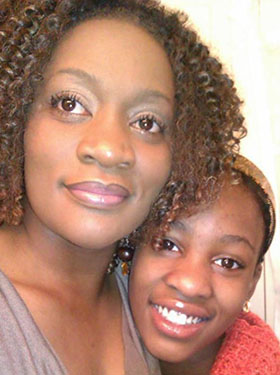In 2000, I enrolled at Fayetteville Technical Community College (FTCC) in Fayetteville, North Carolina, as a mother. Early on I experienced something that almost made me withdraw from school. At the end of my first semester, my daughter’s daycare was closed on the same day as one of my finals. Because I had no time to look for another option, I brought her to class with me. She was asleep and the final would not take me very long. The instructor took one look at her and me and told me I could not take the final with her in the classroom whether she was asleep or not. He had no compassion for my circumstance and, when I reflect on it, he kept cutting me off while I was trying to explain my situation. I left the room while trying to maintain a small amount of my dignity (I was begging by that point) and burst into ugly tears as soon as I closed the door. A friend and fellow work-study student walked by and asked why I was crying. I am still unsure how I got the words out. He said, “Girl. Give me this baby and go take that final.” I thanked him, collected myself, and aced the final while he waited near the door with my daughter.
What my friend did not know is that the minute that instructor looked at my daughter and me the way he did, I decided that going back to school wasn’t meant for me. I wasn’t going to subject either of us to looks of disdain and intentional ostracizing. I was going to quit. My friend, in less than 25 minutes, provided me with in-the-moment support. He took the time to ask me what was wrong, listen to my terrified response, and do what he could to help me—in that moment. The instructor was an anomaly. I consistently credit FTCC with modeling stellar student support services and giving me the foundational tools I needed to navigate higher education. Outside of this one experience, FTCC welcomed us, and I often tell her she earned an associate degree right along with me.
I share this memory to give you some sense of what comes to mind when I think about the kinds of support services that student parents need while attending community colleges. The Institute for Women’s Policy Research found that 4.7 million undergraduates are parents and 54% percent are single parents (43% mothers, 11% fathers). Mothers of color are the most likely to pursue undergraduate degrees, with Black women topping that list (Gault, Rechlin, Reynolds, & Froehner, 2014). My story isn’t unique.
I share experiences with other mothers who have attended community colleges, but particularly with mothers who have done so and have eventually gone on to further their education. White (2014), in presenting a case for affordable on-campus childcare, highlighted the then graduate student Michelle Marie’s experiences as an undergraduate student and a parent. I was particularly taken with her reflections dealing with data collection and, essentially, listening.
At the time, nobody was asking me if I was a student parent. Nobody was saying, ‘Hey, we're aware that you're a member of a population that is perhaps not served by the services and resources that are available.’ I felt like I had to set aside my parent status in order to be a student (White, 2014, para. 1).
Colleges most often judge success by course or degree completion within a certain number of years. I find this to be an incomplete measure of student support services’ success. By these metrics, parents, often “succeed” despite unnecessary roadblocks. It is important that student parents are provided opportunities to share the roadblocks or workarounds they employ in ways that are valued as road maps for future students and insight into areas where our institutions need to be improved. We are not just complaining. While flexibility in class offerings and office hours, timely and adequate financial aid possibilities and decisions, affordable onsite daycare (with affordability based on student income as opposed to faculty income), listings of wraparound services, and child-welcoming environments are vitally important supports, listening to us in a way that connects our stories might be the most helpful support of all. Listening is what my community college got right. It is in the collection of qualitative data that you find that small, well-thought-out adjustments not only support parents but also end up supporting student bodies in general. However institutions name us, student parents, parenting students, students with families, single parents pursuing education, we are a large and ever-growing, and often sought out, sector of college students, and our nuanced experiences are important to higher education writ large.
Further Relevant Readings
- Improving Child Care Access to Promote Postsecondary Success among Low-Income Parents
- Single Mothers & College Success: Creating Pathways Out of Poverty
- College Students with Children are Common and Face Many Challenges in Completing Higher Education
- Who’s Missing From This Picture? Single Parent Students
- The Family-Friendly Campus Imperative
- Gault, B., Reichlin, L., Reynolds, E., & Froehner, M. (2014). 4.8 million college students are raising children. Washinton, DC: The Institute for Women's Policy Research.
- White, G. B. (2014, December 11). The quiet struggle of college students with kids. Washington, DC: The Atlantic.
